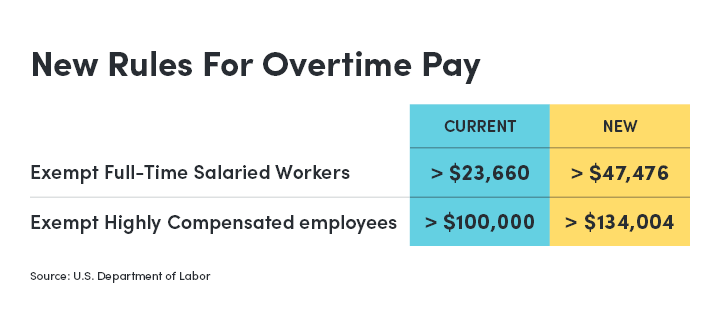Judge Blocks New Overtime Rule
A federal judge has blocked the U.S. Department of Labor’s controversial new overtime rule, nine days before it was due to go into effect.
The ruling from U.S. District Judge Amos Mazzant in the Eastern District of Texas is either a temporary reprieve–or very good news–for employers in Connecticut and across the country.

If implemented, the new overtime rule could cost U.S. businesses more than $1 billion according to the Congressional Budget Office.
“A preliminary injunction preserves the status quo while the court determines the department’s authority to make the final rule as well as the final rule’s validity,” Mazzant said in his ruling.
The department issued the rule in May, increasing the salary threshold below which workers are eligible for mandatory overtime pay to $47,476 from $23,660—or to $913 a week from $455.
The final rule impacts the white collar exemptions under the Fair Labor Standards Act for executive, administrative, and professional employees.
CBIA HR counsel Mark Soycher said the judge was responding to a lawsuit challenging the labor department’s authority to increase the eligibility threshold for exempt status.
Soycher noted that while Connecticut was not party to the suit, the judge’s ruling applies here and in all states.
“The old salary test and unchanged duties tests will remain until further court proceedings assess the merits of the challenge in more detail,” Soycher said.
“Employers do not need to take any action by Dec. 1 at this time, but keep tuned for further developments, as today’s ruling was not the final word.
“Employers can proceed to implement any planned changes, as that would reflect doing more than the law requires.”
Soycher added that the future of the DoL’s overtime rule also will be impacted by the incoming Trump Administration and the appointment of a new U.S. Secretary of Labor.
‘Victory for Small Business’
Juanita Duggan, president and CEO of the National Federation of Independent Businesses, praised the judge’s decision.
“This is a victory for small business owners and should give them some breathing room until the case can be properly adjudicated,” Duggan said.
Her agency, which sued to block the rule, concluded that 44% of small businesses employ at least one person who would be eligible for overtime under the rule.
Randy Johnson of the U.S. Chamber of Commerce, another plaintiff, also hailed the injunction.
“We are very pleased that the court agreed with our arguments that the Obama administration’s new overtime rule was unlawful and stopped the rule from taking effect on Dec. 1,” he said.
The ruling is either a temporary reprieve–or very good news–for employers in Connecticut and across the country.
"Furthermore, the rule would have reduced workplace flexibility, remote electronic access to work, and opportunities for career advancement. This is a great result.”
Lawsuit
A coalition of 21 states sued to block the rule, as did a number of business groups. The court combined the cases.
Plaintiffs argued that the department's proposal would balloon labor costs while forcing employers to demote salaried employees to hourly pay, which would harm morale.
The department, in a statement, blasted the decision and defended its rule.
“We strongly disagree with the decision by the court, which has the effect of delaying a fair day’s pay for a long day’s work for millions of hardworking Americans,” the statement said.
“The department’s overtime rule is the result of a comprehensive, inclusive rule-making process, and we remain confident in the legality of all aspects of the rule.”
RELATED
EXPLORE BY CATEGORY
Stay Connected with CBIA News Digests
The latest news and information delivered directly to your inbox.


